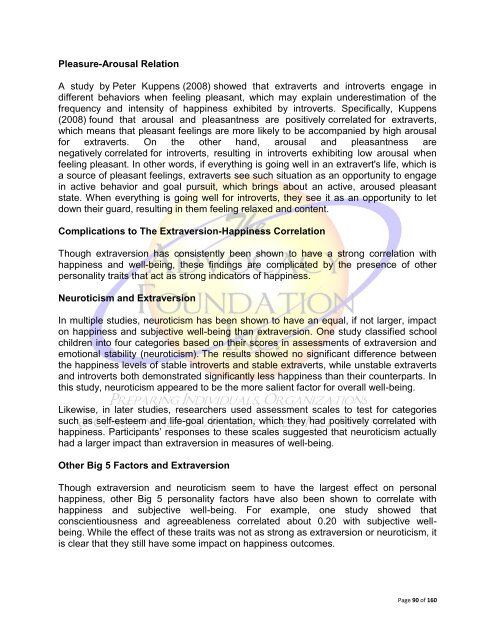The Gift of Introversion
The Gift of Introversion
The Gift of Introversion
You also want an ePaper? Increase the reach of your titles
YUMPU automatically turns print PDFs into web optimized ePapers that Google loves.
Pleasure-Arousal Relation<br />
A study by Peter Kuppens (2008) showed that extraverts and introverts engage in<br />
different behaviors when feeling pleasant, which may explain underestimation <strong>of</strong> the<br />
frequency and intensity <strong>of</strong> happiness exhibited by introverts. Specifically, Kuppens<br />
(2008) found that arousal and pleasantness are positively correlated for extraverts,<br />
which means that pleasant feelings are more likely to be accompanied by high arousal<br />
for extraverts. On the other hand, arousal and pleasantness are<br />
negatively correlated for introverts, resulting in introverts exhibiting low arousal when<br />
feeling pleasant. In other words, if everything is going well in an extravert's life, which is<br />
a source <strong>of</strong> pleasant feelings, extraverts see such situation as an opportunity to engage<br />
in active behavior and goal pursuit, which brings about an active, aroused pleasant<br />
state. When everything is going well for introverts, they see it as an opportunity to let<br />
down their guard, resulting in them feeling relaxed and content.<br />
Complications to <strong>The</strong> Extraversion-Happiness Correlation<br />
Though extraversion has consistently been shown to have a strong correlation with<br />
happiness and well-being, these findings are complicated by the presence <strong>of</strong> other<br />
personality traits that act as strong indicators <strong>of</strong> happiness.<br />
Neuroticism and Extraversion<br />
In multiple studies, neuroticism has been shown to have an equal, if not larger, impact<br />
on happiness and subjective well-being than extraversion. One study classified school<br />
children into four categories based on their scores in assessments <strong>of</strong> extraversion and<br />
emotional stability (neuroticism). <strong>The</strong> results showed no significant difference between<br />
the happiness levels <strong>of</strong> stable introverts and stable extraverts, while unstable extraverts<br />
and introverts both demonstrated significantly less happiness than their counterparts. In<br />
this study, neuroticism appeared to be the more salient factor for overall well-being.<br />
Likewise, in later studies, researchers used assessment scales to test for categories<br />
such as self-esteem and life-goal orientation, which they had positively correlated with<br />
happiness. Participants’ responses to these scales suggested that neuroticism actually<br />
had a larger impact than extraversion in measures <strong>of</strong> well-being.<br />
Other Big 5 Factors and Extraversion<br />
Though extraversion and neuroticism seem to have the largest effect on personal<br />
happiness, other Big 5 personality factors have also been shown to correlate with<br />
happiness and subjective well-being. For example, one study showed that<br />
conscientiousness and agreeableness correlated about 0.20 with subjective wellbeing.<br />
While the effect <strong>of</strong> these traits was not as strong as extraversion or neuroticism, it<br />
is clear that they still have some impact on happiness outcomes.<br />
Page 90 <strong>of</strong> 160

















